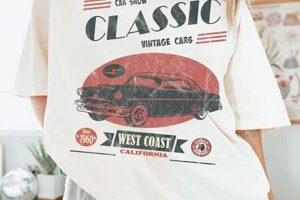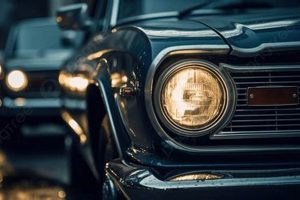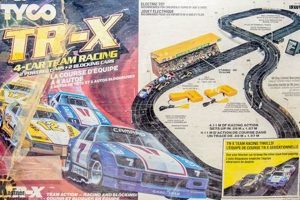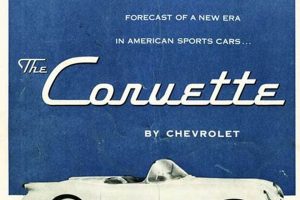The term refers to classic or antique automobiles located in the Dallas-Fort Worth metropolitan area. These vehicles often represent specific eras of automotive design and engineering, reflecting the styles and technologies prevalent during their production years. A well-maintained example might be a 1967 Mustang found at a local car show within the DFW area.
The preservation, restoration, and appreciation of these automobiles offer numerous advantages. They provide insights into the history of transportation and industrial design. Furthermore, they can act as valuable assets, with certain models increasing in value over time. The ongoing interest in these vehicles fosters communities of enthusiasts and specialists dedicated to their upkeep and exhibition.
The following sections will delve into specific aspects related to the acquisition, maintenance, and potential investment opportunities surrounding these historical automotive treasures in the Dallas-Fort Worth region. This includes sourcing information, restoration services, and events showcasing notable examples.
DFW Vintage Cars
This section outlines critical points to consider when engaging with classic automobiles in the Dallas-Fort Worth area, from acquisition to long-term preservation.
Tip 1: Conduct Thorough Pre-Purchase Inspections: Prior to acquisition, a comprehensive inspection by a qualified mechanic specializing in classic vehicles is paramount. This assessment should encompass engine diagnostics, chassis integrity, and verification of original components to mitigate potential post-purchase complications.
Tip 2: Verify Authenticity and Provenance: Detailed research into the vehicle’s history is crucial. Confirm the car’s originality and provenance through historical records, documentation, and expert appraisals. This step can significantly impact the vehicle’s long-term value and collectibility.
Tip 3: Secure Specialized Insurance Coverage: Standard auto insurance policies are often inadequate for vintage automobiles. Obtain specialized coverage designed for classic vehicles, which factors in agreed-upon value, restoration coverage, and potential appreciation. Consult with insurance providers specializing in classic car insurance.
Tip 4: Establish a Reliable Maintenance Regimen: Consistent maintenance is essential for preserving the operational integrity and aesthetic condition of vintage vehicles. Develop a proactive maintenance schedule addressing lubrication, fluid checks, and component inspections. Employ mechanics experienced with the specific make and model.
Tip 5: Control Environmental Conditions During Storage: Proper storage is vital to prevent deterioration. Store vehicles in climate-controlled environments with stable temperature and humidity levels. Utilize car covers and battery maintainers to minimize environmental impact.
Tip 6: Document All Restoration and Repair Work: Maintain meticulous records of all restoration efforts, repairs, and modifications performed on the vehicle. Detailed documentation enhances the vehicle’s provenance and aids in future maintenance or resale.
Tip 7: Engage with Local Classic Car Communities: Participate in regional classic car clubs and events. These communities offer valuable resources, networking opportunities, and access to specialized knowledge regarding maintenance, restoration, and sourcing components.
Adherence to these guidelines will contribute to a more informed and rewarding experience when interacting with classic automobiles in the DFW region, helping to safeguard both the vehicle’s condition and its inherent historical significance.
The subsequent sections will explore specific resources and opportunities within the Dallas-Fort Worth area for enthusiasts of classic vehicles.
1. Sourcing Authenticity
In the realm of DFW vintage cars, verifying the genuine nature of a vehicle is paramount, impacting its value, historical significance, and long-term collectibility. The following outlines critical considerations when seeking authentic classic automobiles in the Dallas-Fort Worth region.
- Documentation Verification
Original documentation, including the vehicle’s bill of sale, manufacturer’s specifications, and historical maintenance records, serves as primary evidence of authenticity. Scrutiny of these documents for inconsistencies or discrepancies is essential. In the context of DFW vintage cars, a local dealership’s sales record from the vehicle’s original sale within the metroplex adds significant credence.
- Component Matching
Authenticity hinges on the presence of original or period-correct components. Evaluating the engine, transmission, interior elements, and body panels against manufacturer specifications is crucial. A classic Mustang in DFW, for instance, should feature the correct engine block casting numbers and interior trim associated with its model year.
- Expert Appraisal
Engaging a qualified appraiser specializing in classic automobiles provides an unbiased assessment of authenticity. These experts possess the knowledge and experience to identify modifications, incorrect components, and potential fraud. Appraisers with a regional focus on DFW vintage cars understand local market nuances and historical vehicle ownership.
- Provenance Research
Tracing the vehicle’s ownership history reveals its past and any significant events that may have impacted its originality. Investigating past owners, restoration work, and exhibition history can provide valuable insights. A well-documented chain of ownership, particularly within the DFW area, strengthens the vehicle’s claim to authenticity.
The pursuit of authentic vintage automobiles in the DFW area necessitates meticulous investigation and professional consultation. Thorough verification of documentation, components, expert appraisals, and provenance contributes to informed acquisition decisions and preserves the historical integrity of these vehicles.
2. Restoration Expertise
The preservation and enhancement of classic automobiles within the Dallas-Fort Worth (DFW) region hinge significantly on the availability of specialized restoration expertise. These vehicles, representing specific eras of automotive design and engineering, often require intricate and nuanced restoration to maintain their historical accuracy and operational integrity. The quality of restoration directly impacts the vehicle’s market value, collectibility, and overall historical significance. Damage from environmental factors, component degradation, or previous inexpert repairs necessitates skilled intervention to return the vehicle to its original condition or to a carefully maintained state reflecting its age. The presence of restoration specialists within the DFW area, capable of tasks ranging from engine rebuilding to bodywork repair, is therefore a critical component in the life cycle of DFW vintage cars. For instance, a rare pre-war vehicle discovered in disrepair might require extensive metal fabrication and sourcing of authentic parts, tasks demanding a high degree of specialized knowledge and skill.
The expertise available in the DFW area covers a wide spectrum of specializations. These include paint and body specialists familiar with original paint formulations and application techniques, mechanical technicians proficient in diagnosing and repairing complex vintage engines and transmissions, and interior restorers skilled in working with original fabrics and trim materials. The correct identification and sourcing of original or period-correct parts is another crucial aspect of restoration, requiring extensive knowledge of manufacturers’ catalogs, parts suppliers, and salvage operations. Furthermore, ethical considerations play a key role, with conscientious restorers prioritizing the preservation of original components and finishes whenever feasible, opting for repair over replacement when possible. Documented restoration projects, showcasing the meticulous attention to detail employed by DFW-based specialists, serve as evidence of the high standards prevalent within the region’s restoration community.
In summary, restoration expertise forms an indispensable link in the preservation of DFW vintage cars. The skills and knowledge of restoration specialists directly influence the authenticity, value, and long-term viability of these vehicles. While challenges such as sourcing rare parts and managing the costs associated with high-quality restoration exist, the presence of a dedicated and skilled restoration community within the Dallas-Fort Worth area ensures that these automotive treasures can be enjoyed and appreciated for generations to come. This expertise is essential for the local classic car community, ensuring its continued vitality.
3. Local Car Clubs
The relationship between local car clubs and vintage automobiles in the Dallas-Fort Worth (DFW) area is symbiotic, with each entity supporting and enriching the other. These clubs serve as hubs for enthusiasts, owners, and restorers, creating communities centered on the preservation, appreciation, and exhibition of classic vehicles. A direct consequence of this community is the pooling of knowledge, resources, and expertise related to sourcing parts, performing maintenance, and understanding the historical significance of specific makes and models. Without these clubs, the dissemination of such specialized information would be significantly hampered, potentially leading to the neglect or misrepresentation of these automotive artifacts. For example, the DFW chapter of the Antique Automobile Club of America (AACA) regularly organizes meets, shows, and technical seminars, providing members with opportunities to learn from experienced restorers and connect with vendors specializing in vintage car components. These activities contribute directly to the upkeep and preservation of DFW vintage cars.
The practical significance of local car clubs extends beyond mere knowledge sharing. These organizations often act as advocates for the preservation of automotive history, working with local governments and historical societies to protect relevant sites and ensure that vintage vehicles are recognized as valuable cultural assets. Furthermore, car clubs frequently organize charity events and public exhibitions, raising awareness and fostering appreciation for these vehicles among a broader audience. The annual car show hosted by a local club in Grapevine, Texas, for example, not only showcases a diverse range of vintage automobiles but also generates funds for local charities, demonstrating the positive impact these organizations can have on the community. These activities bolster the image of dfw vintage cars and contribute to local tourism.
In conclusion, local car clubs represent a vital component of the DFW vintage car ecosystem. Their role in disseminating knowledge, providing resources, advocating for preservation, and organizing public events is indispensable. While challenges such as attracting younger members and maintaining active participation exist, the continued presence and support of these organizations are crucial for ensuring the long-term survival and appreciation of classic automobiles in the Dallas-Fort Worth area. Their existence is essentially intertwined with the well-being of the local vintage car scene.
4. Market Valuation
The process of determining the monetary worth of classic automobiles located in the Dallas-Fort Worth (DFW) metropolitan area is a complex undertaking influenced by a confluence of factors. Accurate market valuation is critical for both buyers and sellers, informing purchase decisions, insurance coverage, and potential investment strategies. The interplay between these factors can significantly affect the assessed value of DFW vintage cars.
- Condition Assessment
The physical state of a classic vehicle significantly influences its market valuation. Vehicles in pristine, original condition typically command a premium. Factors such as rust, body damage, interior wear, and mechanical functionality are meticulously assessed. For example, a 1965 Mustang found in DFW exhibiting minimal corrosion and retaining its original drivetrain would be valued higher than a comparable model with extensive restoration work.
- Rarity and Production Numbers
Limited production runs and unique features contribute to increased market value. Vehicles with verifiable low production numbers or rare options packages are highly sought after by collectors. A specific example would be a Shelby Cobra originally sold through a DFW dealership; its rarity and local history would amplify its market appeal and value.
- Historical Significance and Provenance
A vehicle’s documented history and ownership lineage can substantially affect its valuation. Provenance details, such as celebrity ownership, participation in significant races, or documented restoration by renowned specialists, enhance desirability. A DFW-based vintage car with a verifiable connection to a prominent local figure or event would command a higher price due to its historical association.
- Market Trends and Collector Demand
Prevailing market trends and the overall demand for specific makes and models exert a considerable influence on valuation. Collector preferences fluctuate over time, impacting the desirability and price of certain vehicles. Analysis of auction results, sales data, and expert opinions within the classic car market provides insights into current trends affecting DFW vintage cars.
These interconnected elements contribute to the dynamic market valuation landscape for DFW vintage cars. Consideration of condition, rarity, historical significance, and prevailing market trends is essential for accurate appraisal and informed participation in the buying or selling of these classic automobiles. Accurate assessments protect both the buyer and the seller.
5. Storage Solutions
The proper preservation of vintage automobiles in the Dallas-Fort Worth (DFW) area necessitates careful consideration of storage solutions. These vehicles, often representing significant financial investments and historical artifacts, are susceptible to deterioration if not stored correctly. The following points outline essential aspects of storage options relevant to DFW vintage cars.
- Climate-Controlled Environments
Fluctuations in temperature and humidity can accelerate corrosion, damage upholstery, and degrade mechanical components. Climate-controlled storage facilities maintain stable environmental conditions, mitigating these risks. Within the DFW area, specialized storage facilities offer temperature and humidity regulation specifically tailored to the needs of classic vehicles. These facilities often represent a substantial investment but are considered essential for long-term preservation.
- Security Measures
Theft and vandalism pose significant threats to DFW vintage cars. Secure storage facilities implement security measures such as surveillance systems, gated access, and alarm systems to protect these valuable assets. Some facilities offer individual storage units with customized security features for added protection. The cost of enhanced security directly correlates with the level of protection afforded to the vehicle.
- Vehicle Preparation
Prior to storage, proper preparation is crucial to prevent damage. This includes cleaning the vehicle, applying protective coatings, disconnecting the battery, and stabilizing fuel. Specialized storage services in the DFW area offer comprehensive vehicle preparation packages, ensuring that the vehicle is properly protected against deterioration during storage. Neglecting these steps can result in costly repairs upon retrieval.
- Accessibility and Maintenance
While long-term storage is often necessary, periodic access for maintenance and inspections is essential. Storage solutions that offer convenient access and allow for basic maintenance activities are highly desirable. Some DFW-area facilities provide on-site maintenance services, allowing owners to address minor issues without removing the vehicle from storage. This accessibility is a key consideration for owners who actively participate in car shows and other events.
The selection of appropriate storage solutions significantly impacts the long-term preservation and value of DFW vintage cars. Careful consideration of climate control, security, vehicle preparation, and accessibility is essential for protecting these valuable assets. Choosing the right storage option represents a critical investment in the future of these automotive treasures.
6. Specialized Insurance
Classic automobiles within the Dallas-Fort Worth (DFW) area necessitate specialized insurance coverage due to their unique characteristics and valuation complexities. Standard auto insurance policies are often inadequate for these vehicles, which require tailored protection considering their historical significance, rarity, and potential for appreciation.
- Agreed Value Policies
Unlike standard policies that depreciate a vehicle’s value over time, specialized insurance offers agreed value coverage. This means that the policy pays out an agreed-upon amount in the event of a total loss, reflecting the vehicle’s appraised value. For DFW vintage cars, this is crucial as market values can fluctuate significantly. A well-documented appraisal is essential to establish an accurate agreed value. An example would be a meticulously restored 1957 Chevrolet Bel Air, insured for its appraised value rather than a depreciated book value.
- Restoration Coverage
Many classic vehicles undergo restoration, which can be a costly process. Specialized insurance can include coverage for restoration work in progress, protecting the investment during the restoration phase. This is particularly relevant for DFW vintage cars undergoing extensive repairs or upgrades. For instance, a classic Mustang undergoing a complete engine rebuild at a DFW-based restoration shop could be covered for potential damage or loss during the process.
- Spare Parts Coverage
Sourcing and acquiring spare parts for vintage automobiles can be challenging and expensive. Specialized insurance often includes coverage for spare parts, protecting against loss or damage. This is beneficial for DFW vintage car owners who maintain a collection of spare parts for their vehicles. A collection of original carburetors or trim pieces for a classic Cadillac could be covered under this provision.
- Roadside Assistance for Classic Cars
Breakdowns are more common with older vehicles. Specialized insurance policies offer roadside assistance tailored to the needs of classic cars, including towing to specialized repair shops. This is crucial for DFW vintage cars, as standard towing services may not have the expertise to handle these vehicles without causing damage. A classic Jaguar experiencing a mechanical issue on a DFW highway could benefit from specialized roadside assistance designed for vintage vehicles.
The complexities associated with DFW vintage cars demand specialized insurance solutions tailored to their unique needs. Agreed value policies, restoration coverage, spare parts protection, and classic car roadside assistance provide comprehensive safeguards for these valuable assets, ensuring their preservation and enjoyment for years to come. This coverage is a fundamental aspect of responsible ownership.
7. Event Calendars
Event calendars serve as crucial informational resources for enthusiasts and owners of vintage automobiles in the Dallas-Fort Worth (DFW) area. These calendars centralize details regarding car shows, auctions, swap meets, club meetings, and other relevant gatherings. Access to this information enables individuals to actively participate in the local classic car community, fostering a sense of shared enthusiasm and facilitating opportunities for networking and commerce.
- Local Car Club Listings
Event calendars frequently feature scheduled meetings, technical workshops, and social gatherings organized by local car clubs. These events provide opportunities for members to share knowledge, collaborate on restoration projects, and discuss pertinent issues related to vintage car ownership. For instance, a calendar might list the monthly meeting of a DFW-based Model A Ford club, including the location, agenda, and contact information for further inquiries. Such listings facilitate community engagement and contribute to the preservation of automotive knowledge.
- Car Show and Auction Announcements
Calendars provide information regarding upcoming car shows, auctions, and concours d’elegance events in the DFW area. These events offer platforms for showcasing restored vehicles, assessing market values, and engaging with potential buyers or sellers. A calendar might announce the annual Autorama car show at the Dallas Market Hall, specifying the dates, entry fees, and judging criteria. This information is critical for owners seeking to exhibit their vehicles or prospective buyers looking to acquire classic automobiles.
- Swap Meet and Parts Vendor Details
Event calendars often include details regarding swap meets and gatherings of parts vendors specializing in vintage car components. These events provide opportunities for sourcing rare or hard-to-find parts essential for restoration and maintenance. A calendar might list a swap meet at the Texas Motor Speedway, specifying the dates, vendor fees, and types of parts typically available. This information is invaluable for owners seeking to maintain the authenticity and functionality of their vintage vehicles.
- Driving Tours and Rallies
Calendars may feature information about organized driving tours and rallies specifically designed for classic automobiles. These events offer opportunities for owners to enjoy their vehicles in a controlled and social environment, often traversing scenic routes and historical landmarks. A calendar might announce a vintage car rally through the Texas Hill Country, detailing the route, registration fees, and vehicle eligibility requirements. These events promote camaraderie and showcase the enduring appeal of classic automobiles.
In summary, event calendars are indispensable tools for navigating the vibrant community surrounding DFW vintage cars. By consolidating information regarding car club activities, shows, auctions, swap meets, and driving tours, these calendars empower enthusiasts and owners to actively participate in the local classic car scene and contribute to the preservation of automotive history within the Dallas-Fort Worth metropolitan area. They keep the enthusiast connect to DFW vintage cars.
Frequently Asked Questions
This section addresses commonly encountered queries regarding the acquisition, maintenance, valuation, and preservation of classic automobiles in the Dallas-Fort Worth metropolitan area. The information provided aims to clarify prevalent misconceptions and offer guidance to enthusiasts and prospective owners.
Question 1: What constitutes a “vintage” car within the DFW context?
While specific definitions vary, generally, a vehicle at least 25 years old is considered a classic car. Some classifications further differentiate based on age, designating vehicles over 45 years old as antiques. The term “vintage” is often used broadly to encompass both classifications within the DFW area. Specific insurance and registration criteria may apply based on the vehicle’s age.
Question 2: Where can authentic classic automobiles be reliably sourced in the DFW area?
Reputable sources include established classic car dealerships, specialized auction houses, private collectors, and well-known online marketplaces. Thorough due diligence, including independent inspections and verification of provenance, is paramount regardless of the source.
Question 3: How can the authenticity of a DFW vintage car be verified?
Verification involves scrutinizing original documentation, such as bills of sale and manufacturer specifications; confirming the presence of original or period-correct components; engaging a qualified appraiser specializing in classic vehicles; and researching the vehicle’s ownership history. Discrepancies should be carefully investigated.
Question 4: What are the essential considerations for storing a classic automobile in the DFW climate?
Climate-controlled storage is highly recommended to mitigate the effects of temperature and humidity fluctuations. Secure storage facilities with alarm systems and gated access are also advised. Proper vehicle preparation, including cleaning, applying protective coatings, and disconnecting the battery, is crucial prior to storage.
Question 5: Why is specialized insurance necessary for DFW vintage cars?
Standard auto insurance policies typically depreciate a vehicle’s value over time, which is inappropriate for classic automobiles that may appreciate in value. Specialized insurance offers agreed value coverage, restoration coverage, spare parts protection, and roadside assistance tailored to the needs of classic cars.
Question 6: What resources are available for connecting with other classic car enthusiasts in the DFW area?
Local car clubs, online forums, and regional events provide opportunities for networking and knowledge sharing. Participation in these communities can offer valuable insights regarding maintenance, restoration, and sourcing components for DFW vintage cars.
Accurate information and careful planning are essential when engaging with DFW vintage cars. Consulting with qualified professionals and conducting thorough research are highly recommended.
The subsequent section will delve into case studies of notable DFW vintage car restorations and collections.
Conclusion
The preceding exploration of DFW vintage cars has underscored the multifaceted nature of this specialized automotive niche. Key considerations, ranging from authentic sourcing and expert restoration to appropriate storage and insurance, significantly impact the long-term preservation and valuation of these vehicles. The engagement with local car clubs and the diligent utilization of event calendars serve to foster a vibrant community dedicated to the appreciation of automotive history within the Dallas-Fort Worth region.
Ultimately, the responsible stewardship of DFW vintage cars requires a commitment to diligent research, meticulous maintenance, and informed decision-making. The enduring appeal of these vehicles lies not only in their aesthetic qualities but also in their representation of technological innovation and cultural heritage. Continued dedication to their preservation will ensure that future generations can appreciate these tangible links to automotive history.







